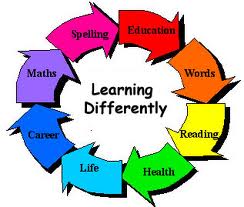Articles (Learning Disabilities) « Disabilities – Learning

Learning Disabilities – Articles
- 10 Apps for Learners Who Struggle with Reading and/or Writing (EduBlogs – 2/21/12)
Despite the growing use of multimedia in classrooms, schools remain primarily text oriented. This is a major problem for significant numbers of learners who struggle with text. So, as I've explored possibilities with the iPhone and iPad, my most urgent priority has been to discover free and low-cost tools that can be effective in supporting individuals who struggle with text. - Accommodating College Students with Learning Disabilities (About.com)
As more students with learning disabilities are graduating and entering college, instructors may be challenged in meeting the needs of these diverse learners. This article contains a list of suggestions that can help college instructors better meet the needs of students with disabilities. As an instructor, there are many ways you can accommodate students with learning disabilities. Learn how. - How Can I Help my Child with Reading Comprehension? (About.com)
I have an 8 year old daughter whom was diagnosed with a learning disability in 3rd grade. I am concerned because she is having problems retaining information when studying for a test. We study at home and she seems to know the information however when she gets to class she doesn't recall it. What can I do in order for her to do well on taking test in school? - 'Independence' Is The Scariest Word: My Life With Learning Disabilities (Huffington Post 6/6/12)
Bullying. It's getting a lot of attention. We hear almost daily of another story where someone who is considered "different" is laughed at, teased, pushed around — or worse. And where teasing and bullying can lead to sad consequences. Young adults with learning disabilities understand how hard it is to be "different." I am no stranger to these difficulties because I have learning disabilities, or as I like to call them, learning differences. - Learning Disabilities (MedicineNet.com)
Researchers think that learning disabilities are caused by differences in how a person's brain works and how it processes information. Children with learning disabilities are not "dumb" or "lazy." In fact, they usually have average or above average intelligence. Their brains just process information differently. - Navigating Learning Disabilities and the Cost for Treatment (5/7/18)
A learning disability can affect multiple areas of a person’s life well into adulthood. What can be helpful, however is early diagnosis and early intervention. By identifying a learning disability and implementing adequate and affordable tools for treatment, your child can have a full and productive life. - Misunderstandings About Learning Disabilities (Wrightslaw Way – 10/28/10)
A recent poll indicates that a many Americans do not completely understand the conditions related to learning disabilities. There appears to be a growing public awareness of LD and an understanding that some kids learn differently. But the poll shows that some people do not have a very clear idea of what dyslexia, dyscalculia, and other learning disabilities are. About 80 percent also linked learning disabilities with intellectual disabilities (referred to as “mental retardation” in the poll); 69 percent with attention deficit hyperactivity disorder; and 75 percent with autism. Under federal law, learning disabilities are defined as neurological disorders that may affect one’s ability to read, spell, write or do math, but are not associated with cognitive ability.“Children with “specific learning disabilities” make up the largest portion, about 40 percent, of 6.6 million students who receive services under the federal Individuals with Disabilities Education Act.” - Outing the Prejudice: Making the Least Dangerous Assumption (Olliebean)
People with disabilities are people first. Because of the presence of a disability, a person may act, get around, look, dance, smile, read, learn, show what she knows, or communicate differently. The key here is that this is a difference and not a deficiency. - Study Links Anesthesia to Learning Disabilities (NPR – 3/25/09)
Children who have had multiple surgeries under general anesthesia by the age of 4 may be at a higher risk of developing learning disabilities, according to a new study by scientists at the Mayo Clinic in Rochester, Minn. - The Learning Disability Mess (Journal of Gender, Social Policy & the Law)
When Congress adopted the Education for All Handicapped Children Act1 (EAHCA) in 1975 and mandated the education of all children with disabilities, a key supporter of the bill noted that “[n]o one really knows what a learning disability is.” Because of this lack of understanding of the term “learning disability,” Congress used a provisional definition of the term and instructed the Commissioner of Education to further study the term and devise a more refined definition as well as a diagnosis. Thirtyfive years later, that definition remains in federal special education law under the Individuals with Disabilities Education Act (IDEA—the modern version of the EAHCA). - Understanding Dysgraphia (WrightsLaw)
Dysgraphia is a specific learning disability that affects how easily children acquire written language and use it to express their thoughts. - When It Hurts (TeenAutism.com)
Sometimes, when you’re the parent of a teen with autism, you have to write letters like this… - Why Johnny and Jenny Can't Write: Disorders of Written Expression and Children with Bipolar Disorder (The Bipolar Child Newsletter)
It is estimated by some who treat and test children with bipolar disorder, that at least half of these children have disorders of written expression.
